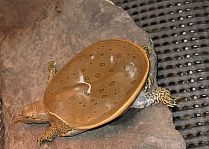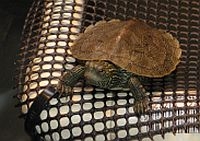 (Host) Some of the ECHO Lake Aquarium’s temporary residents will leave their winter quarters and head home later this week.
(Host) Some of the ECHO Lake Aquarium’s temporary residents will leave their winter quarters and head home later this week.
For the past nine months, the Lake Champlain science center has cared for 32 tiny turtles to help their species survive.
VPR’s Ross Sneyd recently paid a visit, before the turtles are returned to the lake.
(Sneyd) Josh Bakelaar’s office would be the envy of any little kid who’s raised a turtle at home.
A big bathtub-sized tank sits behind his chair, filled with baby turtles. They frolic in the water or sun themselves under heat lamps.
(Bakelaar) "There just really is something captivating about a young baby animal or tiny animals.”
(Sneyd) They are captivating.
 (Bakelaar) "There are these little green sticks and we see a map turtle taking bites off of that stick of turtle food right now. And just got a mouthful and now he’s swimming away with that mouthful and probably has already swallowed it.”
(Bakelaar) "There are these little green sticks and we see a map turtle taking bites off of that stick of turtle food right now. And just got a mouthful and now he’s swimming away with that mouthful and probably has already swallowed it.”
(Sneyd) As fascinating as this is, there’s something very serious going on here.
ECHO is part of an effort to rebuild the population of some of Vermont’s most threatened reptiles.
In one tank, there are two little spiny softshell turtles. They’re listed by the state as "threatened” – because only 200 or 300 adults can be found.
The bigger tank has 20 northern map turtles – described as a species of "special concern” by the state.
Along with them are a couple of eastern snappers and a half-dozen eastern painted turtles – more common species, but still important to Lake Champlain’s ecosystem.
All of the turtles were found last fall by Steve Parren, who heads the nongame species program at the Vermont Department of Fish and Wildlife.
He explores the lakeshore to check on nesting sites. If he finds any new hatchlings that look vulnerable, he scoops them up.
(Parren) "I’m trying to beat the predators in some cases to the nests.”
(Sneyd) He also wants to improve their chance of survival. He says at ECHO, they get fed – and therefore grow – all season long.
(Parren) "If you’re a baby turtle, you got the odds against you. In some years, I’ve lost 80 percent of the eggs to predation. So by shifting that survivorship, I’m hopefully pushing up that 2 percent to maybe 5, maybe even 10 percent. They’ve got several years of being vulnerable as prey for something else. But that’s sort of how the system works.”
(Sneyd) Back at the ECHO Center, Josh Bakelaar doesn’t focus on the stiff odds against his adopted turtles. He’s eager to get them back in the lake.
(Bakelaar) "I’m excited. This is one of the many things that we can do in terms of stewardship for the Lake Champlain basin, which is part of ECHO’s mission. So, to be able to participate in this program, to house these turtles, to help take care of them, to ensure their health, and then to have them go back into the wild, which is ideally where want the turtles to be, it’s fantastic. It’s really exciting.”
(Sneyd) Still, that survival rate is hard to take. So Parren and Bakelaar will take one more step to help the young turtles along. They’ll all be released at different sites along the lake – just in case there’s a predator somewhere nearby.
For VPR News, I’m Ross Sneyd.